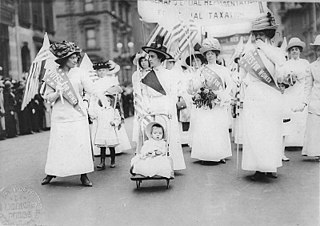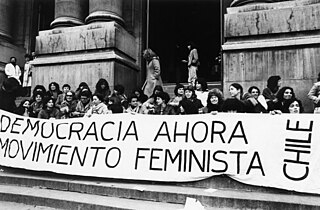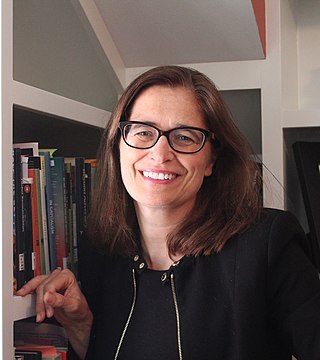Social work is an academic discipline and practice-based profession concerned with meeting the basic needs of individuals, families, groups, communities, and society as a whole to enhance their individual and collective well-being. Social work practice draws from liberal arts, social science, and interdisciplinary areas such as psychology, sociology, health, political science, community development, law, and economics to engage with systems and policies, conduct assessments, develop interventions, and enhance social functioning and responsibility. The ultimate goals of social work include the improvement of people's lives, alleviation of biopsychosocial concerns, empowerment of individuals and communities, and the achievement of social justice.

Individualist feminism, also known as ifeminism, is a libertarian feminist movement that emphasizes individualism, personal autonomy, freedom from state-sanctioned discrimination against women, and gender equality.
School social work is a specialized area of social work concerned with the psychosocial functioning of students to promote and maintain their health and well-being while assisting students to access their academic potential. The School Social Work Association of America defines school social workers as "trained mental health professionals who can assist with mental health concerns, behavioral concerns, positive behavioral support, academic, and classroom support, consultation with teachers, parents, and administrators as well as provide individual and group counseling/therapy."
COYOTE is an American sex workers' rights organization. Its name is a backronym for Call Off Your Old Tired Ethics, a reflection of the fact that sex work tends to be stigmatized primarily because of society-imposed standards of ethics. COYOTE's goals include the decriminalization of prostitution, pimping and pandering, as well as the elimination of social stigma concerning sex work as an occupation. Its work is considered part of the larger sex worker movement for legal and human rights.
Black feminism is a branch of feminism that focuses on the African-American woman's experiences and recognizes the intersectionality of racism and sexism. Black feminism philosophy centers on the idea that "Black women are inherently valuable, that liberation is a necessity not as an adjunct to somebody else's but because of our need as human persons for autonomy."
The Council on Social Work Education (CSWE) is a nonprofit national association in the United States representing more than 2,500 individual members, as well as graduate and undergraduate programs of professional social work education. Founded in 1952, this partnership of educational and professional institutions, social welfare agencies, and private citizens is recognized by the Council for Higher Education Accreditation as the sole accrediting agency for social work education in the United States.

Feminism in Japan began with women's rights movements that date back to antiquity. The movement started to gain momentum after Western thinking was brought into Japan during the Meiji Restoration in 1868. Japanese feminism differs from Western feminism in that less emphasis is placed on individual autonomy.
Professional social workers are generally considered those who hold a professional degree in social work. In a number of countries and jurisdictions, registration or licensure of people working as social workers is required and there are mandated qualifications. In other places, the professional association sets academic and experiential requirements for admission to membership.

Feminism is aimed at defining, establishing, and defending a state of equal political, economic, cultural, and social rights for women. It has had a massive influence on American politics. Feminism in the United States is often divided chronologically into first-wave, second-wave, third-wave, and fourth-wave feminism.
State feminism is feminism created or approved by the government of a state or nation. It usually specifies a particular program. The term was coined by Helga Hernes with particular reference to the situation in Norway, which had a tradition of government-supported liberal feminism dating back to the 1880s, and is often used when discussing the government-supported gender equality policies of the Nordic countries, that are linked to the Nordic model. The term has also been used in the context of developing countries where the government may prescribe its form of feminism and at the same time prohibit non-governmental organizations from advocating for any other feminist program. In this sense it is possible to distinguish between a liberal state feminism found in Western democracies such as the Nordic countries, and a somewhat more authoritarian state feminism that is often also linked to secularism, found e.g. in certain Middle Eastern countries.
Joan Elise Robinson Acker was an American sociologist, researcher, writer and educator. She joined the University of Oregon faculty in 1967. Acker is considered one of the leading analysts regarding gender and class within the second wave of feminism.
Feminism in Thailand is perpetuated by many of the same traditional feminist theory foundations, though Thai feminism is facilitated through a medium of social movement activist groups within Thailand's illiberal democracy. The Thai State claims to function as a civil society with an intersectionality between gender inequality and activism in its political spheres.
Social workers employ education as a tool in client and community interactions. These educational exchanges are not always explicit, but are the foundation of how social workers acquire knowledge from their service participants and how they can contribute to information delivery and skill development.
Sandra Lynn Morgen was an American feminist anthropologist. At the end of her career, she was a professor of anthropology at the University of Oregon, and previously served as vice provost for graduate studies and associate dean of the Graduate School, and director of the University of Oregon Center for the Study of Women in Society.

Feminism in Chile has its own liberation language and activist strategies for rights that is shaped by the political, economic, and social system of Chile. Beginning in the 19th century, Chilean women have been organizing with aspirations of asserting their political rights. These aspirations have had to work against the reality that Chile is one of the most socially conservative countries in Latin America. The Círculo de Estudios de la Mujer is one example of a pioneering women's organization during the Pinochet dictatorship (1973–1989) which redefined women's responsibilities and rights, linking mothers' rights to women's rights and women's civil liberties. The founding members of the Círculo de Estudios de La Mujer consisted of a small group of Santiago feminists who were from the Academia de Humanismo Cristiano. These women gathered "to discuss the situation of women in Chile", their first meeting drew a crowd of over 300 participants and from there challenged the authoritarian life in Santiago. These women helped shape the rights for women in Chile.

Financial social work is an interactive and introspective, multidisciplinary approach that helps individuals explore and address their unconscious feelings, thoughts and attitudes about money. This self-examination process enables people to improve their relationship with their money and thus establish healthier money habits that lead to improved financial circumstances.
The Center for the Study of Women in Society (CSWS) at the University of Oregon in the United States supports feminist research, teaching, activism and creativity. Established in 1973, it is a non-profit partnership between the Associated Students of the University of Oregon Women's Center and the University. According to the Handbook of Gender, Work, and Organization, CSWS is "a major feminist center for scholarship on gender and women".

Brooke A. Ackerly is an American political scientist and Professor of Political Science at Vanderbilt University with affiliations to the Human and Organizational Development Department, Law School, Philosophy Department, and Women's and Gender Studies Program, noted for her research on grounded normative theory, feminist theory, feminist international relations, and scholar activism.

Carceral feminism is a critical term for types of feminism that advocate for enhancing and increasing prison sentences that deal with feminist and gender issues. The term criticises the belief that harsher and longer prison sentences will help work towards solving these issues. The phrase "carceral feminism" was coined by Elizabeth Bernstein, a feminist sociologist, in her 2007 article, "The Sexual Politics of the 'New Abolitionism'". Examining the contemporary anti-trafficking movement in the United States, Bernstein introduced the term to describe a type of feminist activism which casts all forms of sexual labor as sex trafficking. She sees this as a retrograde step, suggesting it erodes the rights of women in the sex industry, and takes the focus off other important feminist issues, and expands the neoliberal agenda.






